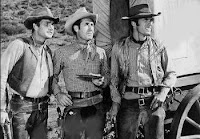 It was the first time I had seen Clint Eastwood, but I hadn't a clue who he was. I only knew him as Rowdy Yates. HE was a sort of assistant to Gil Favor who was the boss of what seemed like a continuous cattle drive across America that never started or ended anywhere. Along the way, they encountered all sorts of problems, some of their own making but by the time the hour was up, everything was solved and the cowboys were back up on their horses and responding to Mr Favor's catchphrase 'Move 'em up and head 'em out!' By the end of 1966 they had all headed out after over 200 black and white episodes, most of which I had probably seen but none of which I can remember. Rowdy would soon become the man with no name for quite a few dollars more and Gil alias Eric Fleming would drown during other filming.
It was the first time I had seen Clint Eastwood, but I hadn't a clue who he was. I only knew him as Rowdy Yates. HE was a sort of assistant to Gil Favor who was the boss of what seemed like a continuous cattle drive across America that never started or ended anywhere. Along the way, they encountered all sorts of problems, some of their own making but by the time the hour was up, everything was solved and the cowboys were back up on their horses and responding to Mr Favor's catchphrase 'Move 'em up and head 'em out!' By the end of 1966 they had all headed out after over 200 black and white episodes, most of which I had probably seen but none of which I can remember. Rowdy would soon become the man with no name for quite a few dollars more and Gil alias Eric Fleming would drown during other filming. It wasn't the only western type programme that the BBC managed to acquire from across the big pond and I was an avid watcher of them all. Wagon Train overlapped Rawhide for years, though it ran to slightly more episodes. The plot was similar, except instead of driving cattle across America, the drove lots of covered wagons. Its hero was Major Seth Adams played by Ward Bond who died halfway through the fourth series but I always remember Coop because the actor who played him had also been a star of Laramie and spoke with the most beautiful American drawl that you can imagine. He played a drifter called Jess Harper and the show lasted for only about four years.
However, long before I even got hooked on that, I'd been glued to the old black and white set, watching Roy Rodgers and Trigger and even though there was no colour, I always imagined the horse as golden though truthfully I never looked forward to Roy's little sing song at the end. It just made the whole thing a bit unreal, 'happy trails' and all that. Around that time, like most kids my age, I was in awe of the masked man, his Indian friend and their two horses, Silver and Scout. 'Who is that masked man?' people would ask and though I hadn't a clue myself, I never thought about his past, only his present and the good that he was doing. In later years I discovered that the Lone Ranger's mask had been made from the vest of his murdered brother and but for the appearance of his childhood friend Tonto, he would also have been killed in the ambush. It was a truly wonderful series not least for the 'Hi Ho Silver and away' at the end of every episode but also the William Tell overture that most people of our day recognised as the Lone Ranger them tune rather than a classical masterpiece.
There were other great western shows to occupy our afternoons and evenings, including Gunsmoke, Bonanza, the Virginian, Champion the Wonder Horse, The Big Valley, The High Chaparral (which was shown on Sunday and we couldn't watch) and Maverick but for some reason it's Rawhide that takes me back. Maybe that's because, somewhere up in my attic I still have an old Rawhide annual and the black and white pencil sketches of Gil and Rowdy are etched in my brain for evermore of a time when life was more straight forward and films just told a good story with a happy ending.
I guess life is generally just a good story too though some parts are less good and others are downright terrible, but for the outsider looking in, it makes pretty interesting viewing, though the ending is not always what we expect. I'm drawn back to the Lone Ranger whose past I knew nothing about and was therefore of no importance to me because he was more concerned in rooting out all kinds of evil. I think it gives us some insight into the mind of our God who, when we come to Him and ask forgiveness for our past, forgets it for ever, because it is no longer important to Him. The prophet Jeremiah talks of God's new covenant with his people when he say 'For I will forgive their wickedness and will remember their sins no more.' So you see, no matter what sort of a story you are writing about your own life, if you find faith in God, there can be a happy ending. Happy Trails!
No comments:
Post a Comment